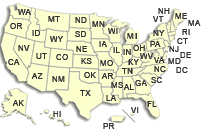Sediment characteristics of North Carolina
streams, 1970-79
Water-Supply Paper 2364
By C.E. Simmons
Abstract
Data collected at 152 sampling sites during 1970-79 were used
to characterize fluvial sediment in North Carolina streams. On
the basis of predominant land use in individual basins, sites
were categorized into one of five groups: forested (7 sites),
forested and affected by minor development (7 sites), rural
affected by agriculture (83 sites), rural affected by
nonagricultural activities (38 sites), and urban (17 sites).
Results of >13,000 suspended sediment samples collected during
the study were used to determine sediment yield, sediment
discharge, concentrations, and other site and basin
characteristics. Fluvial sediment characteristics, such as
yields, are regionalized, with lower values occurring in the
Coastal Plain Province. Statewide, when compared by
predominant land use, minimum annual yields occur in forested
basins and range from 5-88 tons/sq mi; ratios of average
annual yields for forested, rural-agricultural, and urban
sites in the Piedmont Province are approximately 1:6:14,
respectively. During high flow (0.1% flow duration) in
Piedmont basins, the mean suspended sediment concentration for
large urban streams is about 1,600 mg/L as compared with 870
mg/L for rural-agricultural sites and 100 mg/L for forested
sites. Maximum sediment yields of rural-agricultural basins
occur in predominantly clay soil areas of the western
Piedmont, with annual values of as much as 470 tons/sq mi,
whereas minimum yields as small as 7 tons/sq mi occur in the
sandy soil of the Coastal Plain Province. Considerable amounts
of fluvial sediment are deposited on flood plains and
streambeds as major rivers flow from the rolling Piedmont
Province into the flat Coastal Plain Province. For example,
>130,000 tons are deposited annually in an 85 mi stretch of
the Neuse River between stations at Smithfield and Kinston.
Mathematical relations were developed for estimating suspended
sediment transport characteristics at unmeasured
rural-agricultural sites and urban sites in the Piedmont.
Correlation coefficients for the relations range from 0.75 to
0.98, and standard errors of estimate range from 25% to 74%.
The best single-variable equation used log-transformed values
of drainage area.
Citation:
Simmons, C.E., 1993, Sediment characteristics of North Carolina streams, 1970-79: U.S. Geological Survey Water-Supply Paper 2364, 84 p.
|
For more information, contact |
To order printed copies, contact |
North Carolina Water Science Center
U.S. Geological Survey
3916 Sunset Ridge Road
Raleigh, North Carolina 27607
(919) 571-4000
E-mail
|
U.S. Geological Survey
Information Services
Box 25286, Federal Center
Denver, CO 80225
1-888-ASK USGS
|
|
